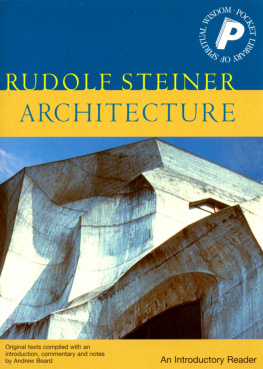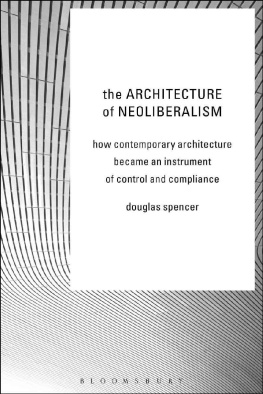Vetter - The Architecture of Control
Here you can read online Vetter - The Architecture of Control full text of the book (entire story) in english for free. Download pdf and epub, get meaning, cover and reviews about this ebook. year: 2012, publisher: John Hunt Publishing, genre: Art / Science. Description of the work, (preface) as well as reviews are available. Best literature library LitArk.com created for fans of good reading and offers a wide selection of genres:
Romance novel
Science fiction
Adventure
Detective
Science
History
Home and family
Prose
Art
Politics
Computer
Non-fiction
Religion
Business
Children
Humor
Choose a favorite category and find really read worthwhile books. Enjoy immersion in the world of imagination, feel the emotions of the characters or learn something new for yourself, make an fascinating discovery.
The Architecture of Control: summary, description and annotation
We offer to read an annotation, description, summary or preface (depends on what the author of the book "The Architecture of Control" wrote himself). If you haven't found the necessary information about the book — write in the comments, we will try to find it.
Vetter: author's other books
Who wrote The Architecture of Control? Find out the surname, the name of the author of the book and a list of all author's works by series.
The Architecture of Control — read online for free the complete book (whole text) full work
Below is the text of the book, divided by pages. System saving the place of the last page read, allows you to conveniently read the book "The Architecture of Control" online for free, without having to search again every time where you left off. Put a bookmark, and you can go to the page where you finished reading at any time.
Font size:
Interval:
Bookmark:
Washington, USA
FIRST PUBLISHED BY ZERO BOOKS, 2012
Zero Books is an imprint of John Hunt Publishing Ltd., Laurel House, Station Approach,
Alresford, Hants, SO24 9JH, UK
office1@jhpbooks.net
www.johnhuntpublishing.com
www.zero-books.net
For distributor details and how to order please visit the Ordering section on our website.
Text copyright: Grant Vetter 2012
ISBN: 978 1 78099 293 8
All rights reserved. Except for brief quotations in critical articles or reviews, no part of this book may be reproduced in any manner without prior written permission from the publishers.
The rights of Grant Vetter as author have been asserted in accordance with the Copyright,
Designs and Patents Act 1988.
A CIP catalogue record for this book is available from the British Library.
Design: Stuart Davies
Printed and bound by CPI Group (UK) Ltd, Croydon, CR0 4YY
We operate a distinctive and ethical publishing philosophy in all areas of our business, from our global network of authors to production and worldwide distribution.
DEDICATED TO WENDY AND KATIE.
If the capitalist market and the inspection house (the plan) are two forms of the same thing, and this thing, as I will show, is ultimately a disciplinary mechanism in which the individuals freedom is limited to a choice from a given menu and they are prevented from defining the context of their interaction, then emancipatory political theory and practice must find a way beyond this dichotomy, to discover forms of social interaction that cannot be reduced to the disciplinary and organizational features of the market or the prison.
Massimo De Angelis
First and foremost, I would like to thank Katie Herzog, both for the homage my book pays to the title of one of her artist-book projects Feng Shuing the Panopticon and for her practice as an artist, which has been both inspiring and timely. Her ability to develop dynamic forms of artistic and social practice that are situated at the site of knowledge production has certainly been an invaluable contribution to the project undertaken here. In locating and comparing conceptual incongruities through experimental lexicongraphy, new methods of disjunctive librarianship and alternative models of archivization, her work opens up new spaces for thinking about epistemology and power in the discursive field a theme which figures prominently throughout this text. Such an endeavor is certainly one of the most pressing issues of our day, both creating a potential for what Foucault called the unthought as well as a confrontation with the categorical determinations of bio-power and govern-mentality. Above all else, it is Herzogs rigorous questioning of textual and aesthetic categories that this text finds a certain shared trajectory with as well as the hope of resisting (neo)Panopticism. These constants in Herzogs work have been a wonderful lesson for me in reflecting not only on the abstract qualities of language, but on the concrete interventions that can be made in language as a thing, a texture, a template and a tempest of imaginative potentials. Our exchanges have always been furtive ones and I encourage all the readers of this work to investigate her publications as well as her curatorial and artistic projects as they have been a guiding light in the production of this work.
I would also like to thank Justin Bower for the feedback and regular criticism I receive from him regarding many of the live debates around post-humanism and subjectivation. His regular countenance shows itself throughout these pages in any number of unexpected ways. Bowers work as a cultural producer provides a visual counterpart to many of the theories of social control that appear in the pages of this text as well as highlighting some of the conflicted genealogies herein. Through very different mediums we have both been engaged in struggling to define the notion of a weak or saturated subject in various ways for some time now and this text purports to be just one more contribution to that ongoing conversation.
I also own a very special debt of gratitude to Alain Badiou whose personal encouragement and valorization of the manifesto form provided me with a set of permissions to follow my own political commitments and aesthetic inclinations. His spirited defense of philosophy in recent years shows itself in the pages that follow in innumerable ways and has been essential to both the themes and content of this work. His reflections on subjectivation are, perhaps, the most incisive interventions since Lacan or Althusser, and they also play a defining role in the arguments undertaken here.
The advice of Wolfgang Schirmacher also shows itself throughout this work in any number of ways, especially in the sections that address Heidegger, the question of being and the end of metaphysics. My gratitude for his contribution is of the highest measure. He has been an influential figure on the scene of continental philosophy for some time now and his work on culture and technology has motivated a great number of the insights in this text. My heartfelt thanks are extended not only for his personal guidance and mentorship but also for his endless encouragement and boundless enthusiasm for the philosophical enterprise.
This short book also owes a great debt as well to my graduate and undergraduate students at the School of Science and Architecture in California who continue to challenge me with provocative questions about the practice of architecture and its relationship to subjectivation. There is perhaps no better stimulus to continue to delve deeper into the research archives than the exchange of ideas engendered by classroom discussions. I will always be incredibly thankful for the time and care my students have taken in helping to educate me about specific issues pertaining to the relationship of practice and theory, and for making a spirited debate around architecture a regular part of my congress.
In addition to these very personal relationships this work also sits upon the accomplishments of a number of contemporary Foucaultians and theorists in the burgeoning field of surveillance studies, many of whom appear in my endnotes but who should also be mentioned here: Didier Bido, Willam Bogard, Massimo De Angelis, Gary Genosko, Kevin G. Haggerty, Maria Los, David Lyon, Toshimaru Ogura and Mark Poster. Beyond the work of these scholars this text is marked, inscribed upon, negotiated and permeated throughout by all the professors who have had a profound influence on how I think about the notion of subjectivation. They are, in no particular order, Giorgio Agamben, Judith Butler, Juli Carson, Simon Critchley, Manual Delanda, Michael Hardt, Daniel Joseph Martinez, Brian Massumi, Avital Ronell, Wolfgang Schirmacher, Andrezej J. Warminski, and Slavoj iek. Last but not least, this text was allowed to come to fruition through the loving generosity of my wife and family who have always encouraged my passion for philosophy.
A society is thus composed of certain foregrounded practices organizing its normative institutions and of innumerable other practices that remain minor, always there but not organizing discourse and preserving the beginnings or remains of different (institutional, scientific) hypothesis for that society of others. It is in this multifarious and silent reserve of producers that we should look for consumer practices having the double character pointed out by Foucault, of being able to organize both spaces and languages, whether on a minute or a vast scale.
Font size:
Interval:
Bookmark:
Similar books «The Architecture of Control»
Look at similar books to The Architecture of Control. We have selected literature similar in name and meaning in the hope of providing readers with more options to find new, interesting, not yet read works.
Discussion, reviews of the book The Architecture of Control and just readers' own opinions. Leave your comments, write what you think about the work, its meaning or the main characters. Specify what exactly you liked and what you didn't like, and why you think so.










